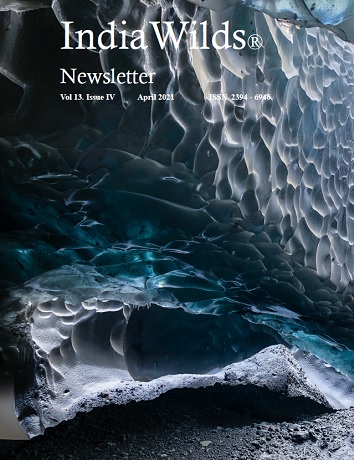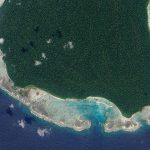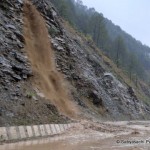IndiaWilds Newsletter Vol. 13 Issue IV
ISSN 2394 – 6946
Climate Crisis: Planet Earth in 2020
The Planet Earth is gripped by a Climate Crisis. Unprecedented heat waves in Arctic, melting of permafrost, sudden extreme weather events like landslides, storms, rains etc are increasingly occurring at a regular frequency. Since the early part of 2020 when the severity of the Covid 19 pandemic became known, Climate Change has been forgotten by the various Governments. Despite occasional mouthing of some vague commitments about climate affirmative actions, not much has happened on the ground. In fact pristine forests continue to be diverted for industrial projects and dams, despite protests by environment lovers.
There were some who initially rejoiced as the pandemic induced lockdown resulted in clear skies, and pollution free rivers. However, that was only for a short period of time before things came back to earlier standards. The World Meteorological Organization (WMO) in its recent “State of the Global Climate 2020” report has said that the pandemic related economic slowdown failed to put a brake on climate change drivers and accelerating impacts. Concentrations of major greenhouse gases like CO2, CH4, and N2O, continued to increase despite the temporary reduction in emissions in 2020 related to measures taken in response to COVID-19.
The extreme weather and covid 19 came as a double whammy for millions of people in 2020. 2020 was the one of the three warmest years of record.
And this is not an isolated incident. The past six years, including 2020, have been the six warmest years on record. Temperatures reached 38.0 °C at Verkhoyansk, Russian Federation on 20 June, the highest recorded temperature anywhere north of the Arctic Circle.
People often fail to realise the real significations of data and can easily ignore 2020 as it is not the hottest year on record. In 2016 which is the hottest year on record, there was an exceptionally strong El Niño which contributes to higher global temperatures. However, in 2020, the El Niño conditions were neutral or comparatively weak to 2016. La Niña contributes to cooling of the ocean surface. By late September 2020 La Niña conditions had developed. So one can realise 2020 could have been worse than 2016.
The global mean temperature for 2020 was 1.2 ± 0.1 °C above the 1850–1900 baseline. The WMO assessment is based on five global temperature data sets. The spread of the five estimates of the annual global mean ranges between 1.15 °C and 1.28 °C above pre-industrial levels and it would be pertinent to mention that Paris Agreement tries to hold the global temperature rise to less than 2 deg c above pre-industrial levels. So if the Paris agreement needs to be effective, then we have to act now or else the temperature rise will be more than 2 °C above pre-industrial levels and then there will be no looking back as it will simply become irreversible.
2020 also saw other extreme weather events. In India, between June and September 2020 the rainfall was 9% more than average. 2020 was one of the two wettest monsoon seasons since 1994. They WMO study finds that “The number of cyclones were above average with 98 named tropical storms in the 2020 northern hemisphere and 2019/2020 southern hemisphere seasons. The North Atlantic region had a very active season, with 30 tropical cyclones this was more than double the long-term average and broke the record for a full season set in 2005.”
Cyclone Amphan which hit India and Bangladesh on 20th May 20020, had reached category 5 in the Bay of Bengal and then lowered to Category 2 storm during landfall. It resulted in 129 deaths because 1.3 million people were evacuated before hand in the state of Odisha. There were large scale evacuations in Bangladesh as well. However, the economic impact was undeniable. Cyclone Amphan caused $14 billion US Dollars worth economic loses. Similarly there have been many loss of life and economic losses due to other cyclones throughout the world in 2020.
The Arctic and Antarctic are getting impacted by climate change and that is a serious cause of concern. Every year the sea ice melts during the summer and scientists have been recording the minimum level of sea-ice cover. Since the record keepings began, September 2020 marks the second lowest sea-ice recorded in the Arctic. The reports says that the sea-ice retreat in the Laptev Sea was the earliest observed in the satellite era.
The Climate change induced warming is also resulting in massive changes to Antarctica. The Antarctic mass loss trend accelerated around 2005, and currently, Antarctica loses approximately 175 to 225 Gt of ice per year. All this loss of sea ice means the sea water level is rising. It means human habitations along the coasts are going to be inundated soon. Low lying atolls and island nations have nowhere else to go when the sea level rise results in drowning of their cities. Even many coastal cities in India, including some of our metro cities are going to be impacted. The coastal communities are often the most marginal among the communities and their displacement is going to result in lot of economic challenges as well as social strife.
The WMO report points out that “Over the past decade (2010–2019), weather- related events triggered an estimated 23.1 million displacements of people on average each year. The overwhelming majority of weather-related displacements take place within national borders, though cross-border movements may also occur. Some 9.8 million displacements, largely due to hydrometeorological hazards and disasters, were recorded during the first half of 2020, mainly concentrated in South and South-East Asia and the Horn of Africa.”
India too has to be prepared to face human displacements due to climate change induced extreme weather events like rains, flooding, landslides, seal level rise etc. It would be difficult for a country like India to handle millions of poor leaving their homes and trying to settle elsewhere. In 2020 we have already seen the painful tragedy of people walking down hundreds of kilometers to reach their villages during lockdown. Such kinds of repeated journeys will take away the faith of the people on Government. A nation remains effective till the time majority of the people have faith in the governance of the Government. Without that chaos will reign supreme.
Climate change is an issue that can’t be put on the backburner even while fighting a serious pandemic as actions need to be taken all the time. Else, we will live to regret it.
Conservation News:
101 Nobel laureates issue joint statement against burning fossil fuels.
In an unprecedented move Dalai Lama and hundred other Noble laureates have signed a joint statement against burning of fossil fuels calling it the major contributor to climate change. Highlighting the fact that the burning of fossil fuels has resulted in 80% of carbon dioxide emissions since Industrial revolution, they have urged to follow science, phase out fossil fuels and invest in renewable energies. This letter had been coordinated by the NGO Fossil fuel treaty. The following is the statement in full.
Nobel Laureates’ Statement to Climate Summit World Leaders: Keep Fossil Fuels in the Ground
As Nobel Laureates from peace, literature, medicine, physics, chemistry and economic sciences, and like so many people around the globe, we are seized by the great moral issue of our time: the climate crisis and commensurate destruction of nature.
Climate change is threatening hundreds of millions of lives, livelihoods across every continent and is putting thousands of species at risk. The burning of fossil fuels – coal, oil, and gas – is by far the major contributor to climate change.
We write today, on the eve of Earth Day 2021 and the Leaders’ Climate Summit, hosted by President Biden, to urge you to act now to avoid a climate catastrophe by stopping the expansion of oil, gas and coal.
We welcome President Biden and the US government’s acknowledgement in the Executive Order that “Together, we must listen to science and meet the moment.” Indeed, meeting the moment requires responses to the climate crisis that will define legacies. Qualifications for being on the right side of history are clear.
For far too long, governments have lagged, shockingly, behind what science demands and what a growing and powerful people-powered movement knows: urgent action is needed to end the expansions of fossil fuel production; phase out current production; and invest in renewable energy.
The burning of fossil fuels is responsible for almost 80% of carbon dioxide emissions since the industrial revolution. In addition to being the leading source of emissions, there are local pollution, environmental and health costs associated with extracting, refining, transporting and burning fossil fuels. These costs are often paid by Indigenous peoples and marginalized communities. Egregious industry practices have led to human rights violations and a fossil fuel system that has left billions of people across the globe without sufficient energy to lead lives of dignity.
For both people and the planet, continued support must be given to tackling climate change through the United Nations Framework Convention on Climate Change and its Paris Agreement. Failure to meet the Paris Agreement’s temperature limit of 1.5°C risks pushing the world towards catastrophic global warming.
Yet, the Paris Agreement has no mention of oil, gas or coal. Meanwhile, the fossil fuel industry continues to plan new projects. Banks continue to fund new projects. According to the most recent United Nations Environment Programme report, 120% more coal, oil, and gas will be produced by 2030 than is consistent with limiting warming to 1.5°C. Efforts to meet the Paris Agreement and to reduce demand for fossil fuels will be undermined if supply continues to grow.
The solution is clear: fossil fuels must be kept in the ground.
Leaders, not industry, hold the power and have the moral responsibility to take bold actions to address this crisis. We call on world leaders to work together in a spirit of international cooperation to:
- End new expansion of oil, gas and coal production in line with the best available science as outlined by the Intergovernmental Panel on Climate Change and United Nations Environment Program;
- Phase out existing production of oil, gas and coal in a manner that is fair and equitable, taking into account the responsibilities of countries for climate change and their respective dependency on fossil fuels, and capacity to transition;
- Invest in a transformational plan to ensure 100% access to renewable energy globally, support dependent economies to diversify away from fossil fuels, and enable people and communities across the globe to flourish through a global just transition.
Fossil fuels are the greatest contributor to climate change. Allowing the continued expansion of this industry is unconscionable. The fossil fuel system is global and requires a global solution – a solution the Leaders’ Climate Summit must work towards. And the first step is to keep fossil fuels in the ground.
Equipment Discussions:
Canon Announces development of Professional Full-Frame EOS R3 Mirrorless Camera
Canon Announces development of Professional Full-Frame EOS R3 Mirrorless Camera
Canon has announced that it is launching the EOS R3, a powerfull fullframe mirrorless camera which is slotted between the EOS R5 and the EOS 1DX Mark III. During the still photography days in the late nineties and early 2000s Canon has its EOS 3 with eye controlled auto focus. Now Canon has brought back the eye controlled autofocus to a camera branded as EOS R3, trying to create a similar segmentation.
The details are still sketchy and we don’t know the resolution yet. Nevertheless, it is expected that the overheating issues faced by the EOS R5 will not be seen in the EOS R3.
PRESS RELEASE
Developing News: Canon Announces That The Powerful Professional Full-Frame EOS R3 Mirrorless Camera Is On Its Way
The Company Is Also Welcoming Three New RF Lenses: The Canon RF100mm F2.8 L Macro IS USM, RF400mm F2.8 L IS USM and RF600mm F4L IS USM
Check below link for more details –
Sennheiser reinvents the MKE 400 compact shotgun microphone
Sennheiser re-invents the MKE 400 – a compact shotgun mic that delivers the professional features you demand from a camera microphone
APRIL 07, 2021
For vloggers, videographers and mobile journalists, storytelling is equal parts art and craft. Perhaps more than anything else, it is sound that makes a story come to life. Whether interviews, commentary or ambience, sound is the key to captivating and drawing in an audience. To provide creators with a tool to explore their sonic horizons, Sennheiser has launched the new MKE 400 – a highly directional compact shotgun microphone that brings compelling audio to DSLR/Ms and mobile devices alike.
“Much has been said about the importance of good audio for video,” says Kai Lange, Senior Product Manager at Sennheiser. “Now, the new MKE 400 lets users experience how vastly it improves in-camera audio, lifting storytelling to the next level and wowing audiences. We’re replacing the well-known and much loved MKE 400 with this new model, and even die-hard fans will agree that the latest version surpasses the original in many ways. The new MKE 400 now also features a headphone monitoring output with volume control, has a rugged internal shock-mount, clever internal windscreen and automatic on/off function, plus it comes with ample accessories included.”
Your audio upgrade: the MKE 400 compact shotgun microphone enhances in-camera audio for vloggers, videographers and mobile journalists
Check beow link for more details –
Natural History
COUNTRY NOTEBOOK: M. Krishnan: ‘Fish Owls‘ shared By Saktipada Panigrahi
https://www.indiawilds.com/forums/showthread.php?8852-Country-notebook-m-krishnan&p=50851#post50851
Photography Tips – Learning Exposure
To make photography learning easier, we are creating a photography tutorial video series. The first part of photography tips is on learning exposure. Check it out in this link: https://youtu.be/PT3vvNIJx1g
Wildlife Photography
Tiger by Sabyasachi Patra
https://www.indiawilds.com/forums/showthread.php?19892-Tiger-in-Bamboo-forest
Leopard by Shyamala Kumar
https://www.indiawilds.com/forums/showthread.php?19883-Leopard-during-the-Monsoons
Black-headed-Ibis with snake by Mrudul Godbole
Painted Francolin by Vineet Shrivastava
https://www.indiawilds.com/forums/showthread.php?19877-Painted-Francolin
Mating-Millipede by Arun Acharjee
https://www.indiawilds.com/forums/showthread.php?19882-Mating-Millipede
Ant Mantis Nymph by Prajwal Ullal
This is the 148th Issue of IndiaWilds Newsletter. A closeup of a receding glacier adorns the coverpage of this issue. This image is from Vatnajokull National Park, Iceland.
We are at a time the inefficiency and apathy of the political leaders have exacerbated the impact of Covid_19. When the entire country is in the grips of this pandemic it is easy for everyone to lose focus on the brewing Climate Crisis. Our Planet Earth is giving us signs which we are consistently failing to read. The melting glaciers are receding at a fast pace. While we are busy wondering at the texture and beauty of the ice formations as the glaciers recede, the core issue remains resolved. When will we take serious steps to fundamentally alter our high carbon lifestyle so that we start limiting the emissions and help contain the global temperature rise to below 2 deg centigrade over the pre-industrial revolution time? Unless people wake up to the reality and demand actions and accountability from their political leaders, our Planet Earth will continue to hurtle down the path of destruction. Public opinion still can change things. So let’s give it a last shot to raise awareness.
http://www.indi
To post in the IndiaWilds forums, you can register free of cost using your Full Name as user id at:
http://www.indiawilds.com/forums/register.php
If you are already a member of IndiaWilds and have forgotten your user id and/or password you can mail to:
administrator@indiawilds.com
Regards,
Sabyasachi Patra
Profile | Contact Us | Facebook | Diary | Equipment reviews | Forums | IndiaWilds You Tube Channel
Please post your views and feedback in the comments below.
- GoPro Hero 12 Black - 6 September,2023
- Leopards: The Last Stand - 2 July,2023
- Drifting in the Waters of Sundarbans - 26 March,2023















Leave a Reply